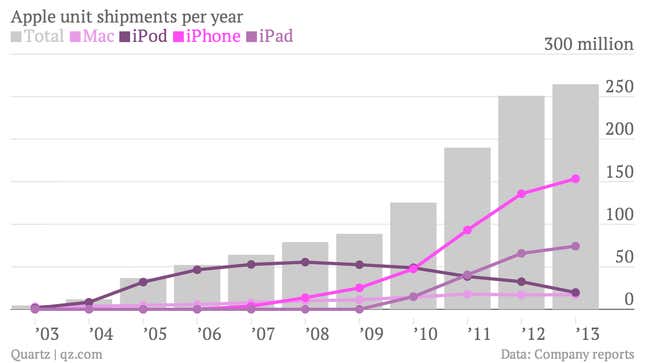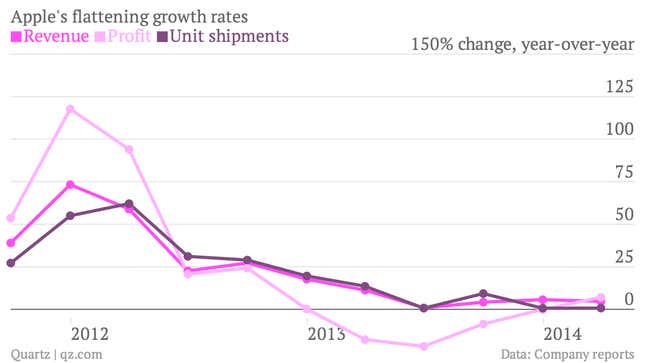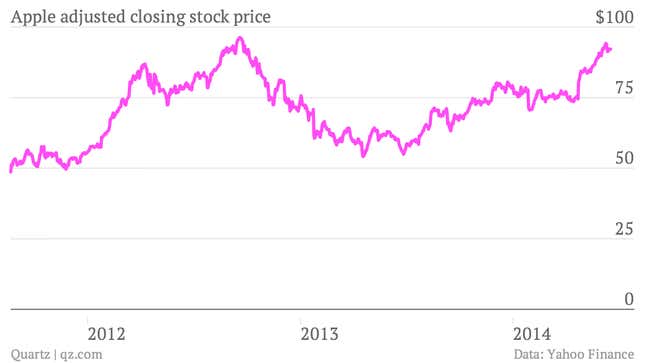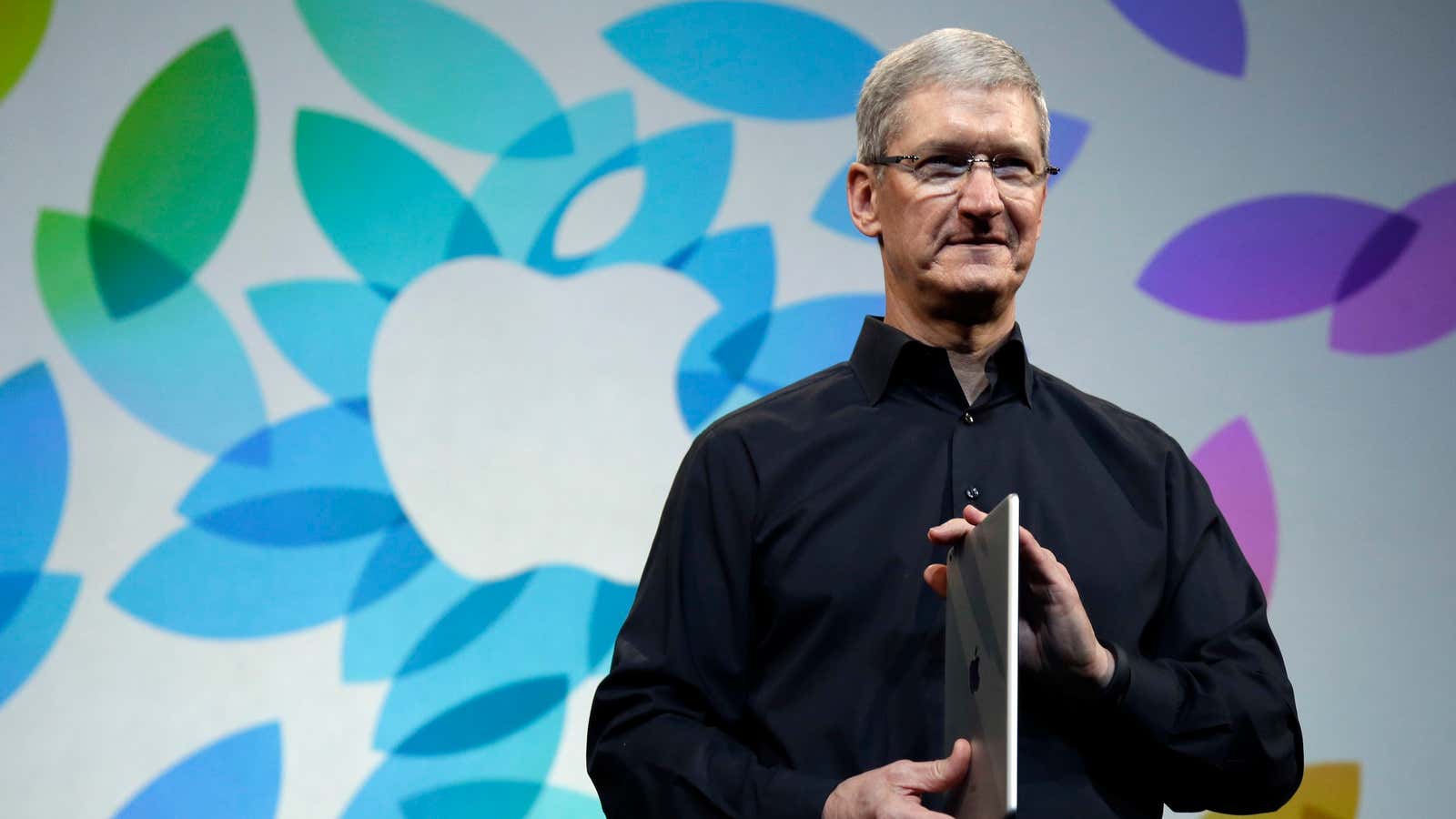As Apple’s product line matures and growth slows, it is easy—perhaps too easy—to criticize Apple CEO Tim Cook for not being enough like Steve Jobs, his legendary predecessor. But that misses the real story: Since taking over as CEO, Cook has made several key moves—including some Jobs might never have considered—to set Apple up for its next big thing.
Waiting for iSomething
Here’s a common, throwaway sort of complaint about Cook: “Show me the ingenuity,” Laurence Balter, chief market strategist at Oracle Investment Research, said in a recent, rather critical New York Times profile of Cook. “Show me the product.”
This is the impatient view of Apple. It has been four years since the iPad debuted, with few major updates since. Meanwhile, an oft-anticipated Apple television set never materialized, and Samsung may launch a third-generation watch-like gizmo before Apple ships its first. Clearly, according to critics, Cook’s Apple is losing its way. Haunted Empire, yes?
But this has long been the Apple way. Even under Jobs, the company spent many years developing new products. Truly major launches only ever happened every several years, with iterations between. It routinely showed up “late” to markets, only to reinvent them. Or it would skip entire product fads—remember netbooks?—and look brilliant when they declined.
Let’s retrace: Jobs re-took control of Apple in early 1997. The first iMac debuted quickly, a year later. But the first iPod didn’t launch until 2001, long after the first MP3 players. The first iPhone took six years after that, years after Palm’s Treo and Nokia’s Symbian phones had millions of users. Then three more years before the iPad, which Jobs unveiled after Microsoft’s then-CEO Steve Ballmer had previewed HP “slate” computers at the CES tech fair. But in each case, Apple’s eventual launch completely changed its industry.

Even if Apple spends another year before launching a new type of device—even if it’s supposedly “late” to market—it wouldn’t be out of character.
Cook’s in the kitchen
What really matters about Cook’s Apple: The company has grown into itself, now able to comfortably ship more than 250 million devices per year—twice as many as in 2010—without incident.
It wasn’t long ago that Apple had to take resources away from the Mac to add to the iPhone. Now the company has accelerated its Mac OS X software release schedule while redesigning both of its operating systems (OS X and iOS) over the past two years. Long-time Apple watcher John Gruber sums it up it well in a recent essay: “Apple has proceeded from being OK at walking and chewing gum to being good at it.”
And as Apple revealed earlier this month at its Worldwide Developers Conference, the company’s units are now working together more effectively than ever before.
In its demonstrations of the next versions of iOS, OS X, and its updated developer tools, Apple revealed that it is making progress at integrating all of its platform experiences, tied together by an increasingly impressive cloud service. One potential reason for this: Cook’s decision to dismiss Jobs’ long-time protégé Scott Forstall in 2012, a move Apple described as designed to “encourage even more collaboration” between the company’s hardware, software, and services teams. If Apple’s latest announcements are any indication, that collaboration is happening, with easy and obvious opportunities for expansion to future devices with both larger and smaller screens.
Apple has continued to make moves under Cook—reflecting awareness of the times—that Jobs may never have supported. Notably, it recently spent $3 billion to acquire Beats Music, an admission of sorts that it needs help to meet its goals in the music industry. It recently relaxed a nondisclosure agreement that restricted fans and developers from discussing beta software. Its latest software creation tools, released this month, give developers deeper access than ever to the iPhone and iPad to make new kinds of apps. Famously secretive, it has granted its employees more freedom on social media—Cook himself even tweets from time to time, on topics ranging from Apple news to sports and human rights. Apple’s iBooks team even uses Twitter in a way that seems strikingly conventional, hosting “chats” with authors, hashtags and everything.
There are also anecdotes of improvements in employee morale, which could potentially help Apple recruit new talent—or at least reduce churn. “I really got a sense talking to people at Apple last week at WWDC that they’re happy—happy in a way they haven’t been again,” Gruber said on the most recent episode of his podcast (this discussion starts around the 42-minute mark). “In fact, one friend literally said the words ‘It’s fun again,’ which I thought was pretty interesting.”
Where’s the growth?
But, skeptics will say, operations have always been Cook’s strength. Meanwhile, reality can’t be ignored: Apple’s growth is slowing significantly by every metric.

Some of this was inevitable. The smartphone market is maturing and Apple’s numbers are getting so large that sales growth was bound to decelerate. The iPhone is responsible for more than half of Apple’s revenue, profit, and growth—meaning extraordinary success or failure in a given cycle has oversized consequences. But this is where Jobs, the product genius, shined—always seeming to have the next big thing ready to roll when necessary. Has Cook figured this out? Or has he at least put the right people in the position to?
One indication that wheels are in motion: Reuters reports that Taiwan’s Quanta Computer will begin production of some sort of Apple smartwatch next month, which will reportedly feature a 2.5-inch display and sensors to monitor health and fitness. Apple’s iPhone business is still so big that it’s unlikely any new wearable device will cause a big lift in its finances immediately. But it’s a start.
Meanwhile, as Quartz’s Matt Phillips writes, Cook has also done a good job working Wall Street, transforming Apple “from the world’s premier growth stock into, arguably, the world’s premier dividend play.” It has bought back shares and just split its stock, an effort Apple hopes will make shares “more accessible to a larger number of investors.” Shares have recently rallied—they’re not far from their all-time high—and are also still up significantly since Jobs’ retirement in 2011, shortly before his death.

There’s always a chance, of course, that Apple is actually in permanent decline and that its next big thing will never come. It’s worth considering what might happen if Apple really can’t rejuvenate its growth—or at least to the same levels as during the iPhone boom. Until Cook delivers the next big thing, skepticism will only keep building. But the most recent signs from the company are strong and smooth. In many ways, Cook is running Apple better than Jobs ever did.
